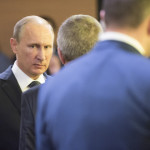
Exclusive: Despite mainstream media acceptance, the U.S. intelligence community’s assessment on alleged Russian “hacking” still lacks hard public evidence, a case of “trust-us” by politicized spy agencies, writes Robert Parry.
Exclusive: The Washington Post’s latest folly – falsely reporting a Russian “hack” into Vermont’s electric grid – reflects the paper’s steep decline from the days of Watergate, reports ex-British intelligence officer Annie Machon.